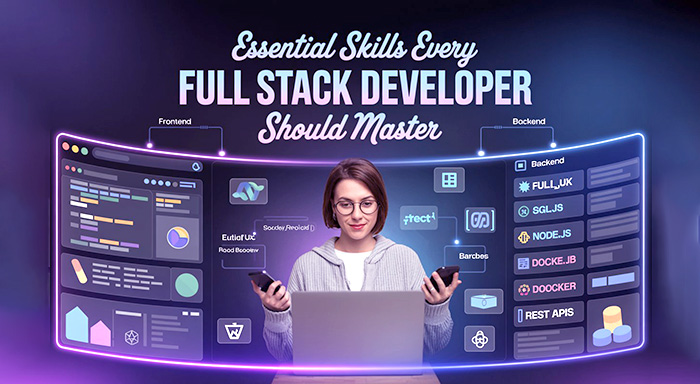In the speed-oriented economy of dotted industries, the companies need developers who are quick, very flexible, and can vary up to the complexity in sheer stack. The Full Stack Developer
In the speed-oriented economy of dotted industries, the companies need developers who are quick, very flexible, and can vary up to the complexity in sheer stack. The Full Stack Developer comes into play, being the very all-rounder of the development world. Whether a new SaaS platform is under construction, an e-commerce site is being revamped, or a scalable mobile app is launched, full stack developers are the speed-makers and innovators.
So, what makes a great full stack developer? What technical skills have the power to separate an entry-level engineer from an associate who can contribute to the implementation of complex, production-grade systems?
This study will cover the core technical and soft skills that need to be mastered by every full stack developer, which not only makes them valuable to any software team but also key contributors to the success of the business.
1. Proficiency in Front-End Technologies
At the front end of an application lies the user interface, which is the space the user interacts with. A full stack developer must particularly be familiar with core front-end technologies like:

- HTML5 and CSS3: These are the very big blocks and bricks of interface design on the web. Deep knowledge in layouts and positioning, responsive algorithms, and modern CSS frameworks like Tailwind or Bootstrap is a must.
- JavaScript (ES6+): Recently introduced features in ECMAScript are useful for one or the other purpose- arrow functions, async/await, modules, etc. Knowing these makes up the standards and laws for any full-stack developer.
- Frameworks and Libraries: React, Vue.js, or Angular--Whatever you choose, know there is a great divide. At least one major front-end framework is non-negotiable in the world of modern development.
And user experiences are everything these days! Building interfaces that are intuitive, responsive, and accessible is absolutely paramount.
Read Also: The Essential Guide to Front-End Web Development Services: What to Look For
2. Back-End Development Skills
Back end is the place where real business logic happens-keeping data, processing requests, authenticating users, and integrating with other systems.

So a good full stack developer will be comfortable with:
- Server-side languages and their frameworks such as:
- Node.js with Express
- Python with Django or Flask
- Java with Spring Boot
- PHP with Laravel
- RESTful API and/or GraphQL development to allow communication between front end and back end.
- Authentication and Authorization using OAuth, JWTs, or session-based methods.
Understanding how the server handles requests and how to write efficient, scalable, and secure code is a mark of a strong back-end engineer.
3. Database Management and Design
Every robust application relies on a solid database structure. Full stack developers must be familiar with:

- Relational databases like PostgreSQL and MySQL
- NoSQL databases like MongoDB or Firebase
- ORMs (Object-Relational Mapping) like Sequelize (Node.js) or SQLAlchemy (Python)
In addition, knowledge of database normalization, indexing, data modeling, and writing efficient queries (especially joins and transactions) is crucial for performance.
4. Version Control and Collaboration Tools
Knowing Git is practically a requirement. A proficient full stack developer should know how to:

- Use Git for source code management (branching, merging, resolving conflicts)
- Collaborate using GitHub or GitLab
- Work in CI/CD pipelines using tools like Jenkins, GitHub Actions, or GitLab CI
Version control is not just about tracking changes—it’s about enabling teamwork, safe deployments, and agile development.
5. Understanding of DevOps and Deployment
Full stack developers should also know how to deploy and maintain the applications they build. This includes:

- Basic Linux commands
- Server setup and management, preferably using cloud services like AWS, Azure, or DigitalOcean
- Containers and Orchestration: Familiarity with Docker and Kubernetes is increasingly valuable
- CI/CD pipelines to automate code testing and deployment
Even if there’s a dedicated DevOps team, developers who understand the deployment ecosystem can troubleshoot better and collaborate more effectively.
6. Basic UI/UX Principles
Full stack developers don't have to be designers, but they should understand the foundational thinking behind human-centered design:

- Intuitive navigation
- Accessibility best practices (like ARIA roles, contrast)
- Mobile-responsive design
- User feedback and validation
By knowing how people will (or won't) use the interface, developers can make more informed decisions and create more cohesive applications.
7. Problem Solving and Debugging
Debugging is an art, and hence a skill every full stack developer must be comfortable with. This includes being able to:

- Read and interpret stack traces
- Use browser dev tools
- Log and monitor production environments
- Write unit and integration testing with tools like Jest, Mocha, or Pytest
A developer who is really good in finding and fixing bugs in a rapid manner adds so much value during development sprints and days in post launch.
8. API Integration and Third-Party Services
These days, applications seldom work in isolation. Whether it's integrating payment gateways, email services, map services, or analytics platforms, full-stack developers need to:

- Be versed in HTTP methods and response codes
- Work comfortably with third party APIs (REST, SOAP, or GraphQL)
- Ensure the external data flows securely, backed by proper authentication tokens
This gives a developer extra muscles, so to speak, for extending application capabilities instead of doing everything from scratch.
9. Security Best Practices
Security needs to permeate every layer of your stack. Some of the more crucial practices include protections against XSS, CSRF, and SQL Injection attacks:

- Encryption of sensitive data
- HTTPS usage and cookie security
- Role-based access control
Developers who are aware of security issues can stop those security exposures that could cost an organization dearly in terms of reputation and resources.
10. Adaptability and Continuous Learning
The technology arena changes very fast. Whatever framework is in vogue today may be considered a dinosaur tomorrow. The best full stack developer understands how to:

- Stay current with industry trends and tools
- Be curious about new technologies
- Thoughtfully review code on a regular basis, accepting any constructive feedback
- Join meetups, work through online courses together, or join in hackathons.
This mindset makes these developers and their projects ready for tomorrow.
Collaboration Makes the Stack Stronger
Beyond individual skills, full stack development is often a team effort. Many modern companies prefer to work with full stack teams that already bear these skills so that they can guarantee faster delivery and smoother handoffs between front-end and back-end systems. [Our team employs this approach in real-world full stack projects.]
Be it a startup working on an MVP or an enterprise optimizing an existing platform, partnering with experts in full stack development services can be a game changer—ensuring both quality and speed across the entire product lifecycle.
Final Thoughts
Full stack mastery means nothing without building integrated, scalable, and user-friendly applications from start to finish.
The full stack developer uses both his technical know-how and his power to collaborate, solve problems, and learn on the go as a core cell for any digital product team.
If you are hiring someone, training him, or becoming one yourself, this should remain with you. It is really much more than a skill set,—it is a roadmap to building better, faster, and smarter in today's web ecosystem.
Respond to this article with emojis






